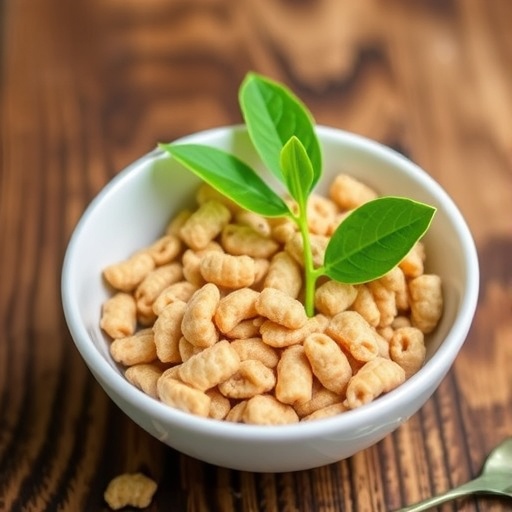In today’s fast-paced world, breakfast cereals have become a staple food for millions, offering convenience for busy mornings. However, behind the familiar packaging and colorful branding lies a complex story of environmental impacts that often go unnoticed. A recent study conducted by Jadhav and Manjare has shed light on this hidden narrative, using life cycle assessment (LCA) to evaluate the ecological footprint of cereal production. This groundbreaking research, published in the journal Environmental Science and Pollution Research, marks a significant step in understanding how our food choices can promote sustainable development.
Life cycle assessment is an effective methodology that scrutinizes the environmental impact of a product from cradle to grave. In the context of breakfast cereals, this means looking at everything from the agricultural practices employed in growing the ingredients—like grains and sweeteners—to the manufacturing processes that turn these raw materials into a finished product. The study’s comprehensive approach highlights how various stages of production can contribute to greenhouse gas emissions, resource depletion, and soil and water deterioration.
One of the study’s key findings reveals that the agricultural phase, particularly the cultivation of grains, significantly contributes to the overall environmental burden. The researchers meticulously evaluated how elements such as nitrogen fertilizer application and irrigation practices can lead to increased emissions of nitrous oxide, a potent greenhouse gas. The results of these agricultural practices underscore the urgent need for sustainable farming techniques that minimize chemical input and optimize water efficiency.
Moving beyond production, the study delves into the energy-intensive manufacturing processes that breakfast cereals undergo. This stage often involves significant electricity consumption and waste generation. The authors argue that implementing innovative technologies and improving energy efficiency in factories could substantially mitigate the environmental impact. Transitioning from fossil fuel reliance to renewable energy sources presents a promising avenue for reducing the carbon footprint associated with cereal production.
The logistics of distribution further complicate the sustainability equation. Transporting finished cereals to retailers and consumers entails considerable energy use, often leading to increased carbon emissions. Jadhav and Manjare urge manufacturers and retailers to rethink their distribution strategies, advocating for localized supply chains and sustainable transportation options that could drastically lower associated emissions.
In addition to energy concerns, packaging materials also play a pivotal role in the environmental impact of breakfast cereals. The study highlights that conventional packaging often endures a lengthy decomposition process, contributing to waste that overwhelms landfills. The authors call for a shift towards eco-friendly packaging solutions, including biodegradable and recyclable materials. This change not only addresses waste management issues but also aligns with evolving consumer preferences for sustainability.
Consumer behavior is another critical factor that the study addresses. The findings suggest that increasing awareness of environmental impacts can lead to changes in purchasing decisions. Educating consumers about the benefits of choosing sustainably produced cereals could foster a market shift towards environmentally friendly products. This pathway suggests that information campaigns and educational initiatives could play a foundational role in shaping a sustainable food system.
Furthermore, the study emphasizes the importance of dietary shifts. While breakfast cereals are often a convenient option, research indicates that diversifying our diets to include more whole grains, fruits, and vegetables could significantly reduce our ecological footprint. Jadhav and Manjare propose initiatives encouraging consumers to explore alternatives to traditional breakfast cereals, which can lead to more sustainable eating habits overall.
A noteworthy aspect of their findings is the global implication of cereal production practices. As developing countries increasingly adopt Western dietary patterns, the environmental impacts of cereal production are likely to expand. The need for international collaboration and knowledge sharing becomes crucial in implementing sustainable practices in these regions. A concerted effort to transfer technology and best practices can facilitate a global transition towards more sustainable food systems.
In conclusion, Jadhav and Manjare’s study serves as a wake-up call for both consumers and producers in the breakfast cereal industry. It not only quantifies the environmental impacts associated with cereal production but also offers actionable insights into mitigating these effects. As we venture into a future marked by climate challenges, this research underscores the imperative to rethink our food systems by embracing sustainable practices. The study paves the way for further research employing LCA methodologies to explore the ecological footprints of various food products, driving us toward a more sustainable future.
As the world grapples with the realities of climate change and environmental degradation, Jadhav and Manjare’s work stands out as a beacon of hope. They encourage stakeholders across the food industry, from farms to factories and consumers, to play their part in creating a healthier planetary ecosystem through conscious choices.
The ripple effects of this research could transform the breakfast cereals market, shaping a future where sustainable production is the norm rather than the exception. Recognizing the role we all play in this system will be crucial in ensuring that our increasingly busy lifestyles do not come at the cost of the environment.
By understanding the intertwined nature of food production and sustainability, we can create powerful change that benefits not only our health but also the planet’s. As individuals and communities, we must embrace the findings of studies like those of Jadhav and Manjare, fostering a culture of sustainability that resonates through every bowl of cereal consumed.
This research invites us to reconsider our breakfasts, pushing us to envision not just what we eat, but how the choices we make ripple throughout the ecosystem. Let us rise to the challenge and advocate for a more sustainable future—one breakfast cereal at a time.
Subject of Research: Environmental impacts of breakfast cereal production using life cycle assessment.
Article Title: Assessment of environmental impacts associated with production of breakfast cereal using life cycle assessment: approach for sustainable development.
Article References:
Jadhav, Y., Manjare, S. Assessment of environmental impacts associated with production of breakfast cereal using life cycle assessment: approach for sustainable development.
Environ Sci Pollut Res (2025). https://doi.org/10.1007/s11356-025-37072-1
Image Credits: AI Generated
DOI: 10.1007/s11356-025-37072-1
Keywords: Life cycle assessment, environmental impact, breakfast cereal, sustainable development, agriculture, manufacturing, packaging, consumer behavior.




